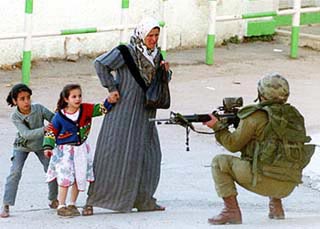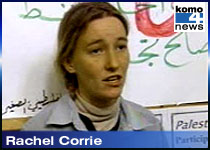
Telling it Like it Isn’t
Robert Fisk
Los Angeles Times
27 December 2005
27 December 2005
I first realized the enormous pressures on American journalists in the Middle East when I went some years ago to say goodbye to a colleague from the Boston Globe. I expressed my sorrow that he was leaving a region where he had obviously enjoyed reporting. I could save my sorrows for someone else, he said. One of the joys of leaving was that he would no longer have to alter the truth to suit his paper's more vociferous readers. "I used to call the Israeli Likud Party 'right wing,' " he said. "But recently, my editors have been telling me not to use the phrase. A lot of our readers objected." And so now, I asked? "We just don't call it 'right wing' anymore." Ouch. I knew at once that these "readers" were viewed at his newspaper as Israel's friends, but I also knew that the Likud under Benjamin Netanyahu was as right wing as it had ever been. This is only the tip of the semantic iceberg that has crashed into American journalism in the Middle East. Illegal Jewish settlements for Jews and Jews only on Arab land are clearly "colonies," and we used to call them that. I cannot trace the moment when we started using the word "settlements." But I can remember the moment around two years ago when the word "settlements" was replaced by "Jewish neighborhoods" — or even, in some cases, "outposts." Similarly, "occupied" Palestinian land was softened in many American media reports into "disputed" Palestinian land — just after then-Secretary of State Colin Powell, in 2001, instructed U.S. embassies in the Middle East to refer to the West Bank as "disputed" rather than "occupied" territory. Then there is the "wall," the massive concrete obstruction whose purpose, according to the Israeli authorities, is to prevent Palestinian suicide bombers from killing innocent Israelis. In this, it seems to have had some success. But it does not follow the line of Israel's 1967 border and cuts deeply into Arab land. And all too often these days, journalists call it a "fence" rather than a "wall." Or a "security barrier," which is what Israel prefers them to say. For some of its length, we are told, it is not a wall at all — so we cannot call it a "wall," even though the vast snake of concrete and steel that runs east of Jerusalem is higher than the old Berlin Wall. The semantic effect of this journalistic obfuscation is clear. If Palestinian land is not occupied but merely part of a legal dispute that might be resolved in law courts or discussions over tea, then a Palestinian child who throws a stone at an Israeli soldier in this territory is clearly acting insanely. If a Jewish colony built illegally on Arab land is simply a nice friendly "neighborhood," then any Palestinian who attacks it must be carrying out a mindless terrorist act. And surely there is no reason to protest a "fence" or a "security barrier" — words that conjure up the fence around a garden or the gate arm at the entrance to a private housing complex. For Palestinians to object violently to any of these phenomena thus marks them as a generically vicious people. By our use of language, we condemn them. We follow these unwritten rules elsewhere in the region. American journalists frequently used the words of U.S. officials in the early days of the Iraqi insurgency — referring to those who attacked American troops as "rebels" or "terrorists" or "remnants" of the former regime. The language of the second U.S. pro-consul in Iraq, L. Paul Bremer III, was taken up obediently — and grotesquely — by American journalists. American television, meanwhile, continues to present war as a bloodless sandpit in which the horrors of conflict — the mutilated bodies of the victims of aerial bombing, torn apart in the desert by wild dogs — are kept off the screen. Editors in New York and London make sure that viewers' "sensitivities" don't suffer, that we don't indulge in the "pornography" of death (which is exactly what war is) or "dishonor" the dead whom we have just killed. Our prudish video coverage makes war easier to support, and journalists long ago became complicit with governments in making conflict and death more acceptable to viewers. Television journalism has thus become a lethal adjunct to war. Back in the old days, we used to believe — did we not? — that journalists should "tell it how it is." Read the great journalism of World War II and you'll see what I mean. The Ed Murrows and Richard Dimblebys, the Howard K. Smiths and Alan Moorheads didn't mince their words or change their descriptions or run mealy-mouthed from the truth because listeners or readers didn't want to know or preferred a different version. So let's call a colony a colony, let's call occupation what it is, let's call a wall a wall. And maybe express the reality of war by showing that it represents not, primarily, victory or defeat, but the total failure of the human spirit.Robert Fisk is Middle East correspondent for the London Independent and the author, most recently, of "The Great War for Civilisation: The Conquest of the Middle East," published last month by Knopf.
www.informationclearinghouse.info/article11391.htm
www.informationclearinghouse.info/article11391.htm


